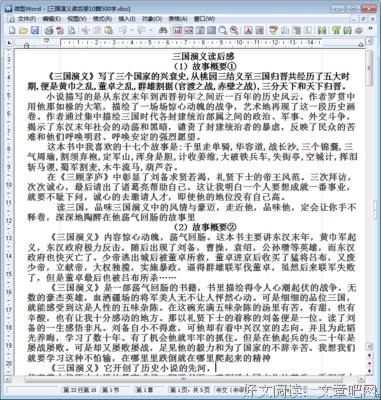《Status Anxiety》读后感100字
《Status Anxiety》是一本由Alain de Botton著作,Penguin出版的Paperback图书,本书定价:GBP 10.99,页数:314,特精心从网络上整理的一些读者的读后感,希望对大家能有帮助。
《Status Anxiety》精选点评:
●学到了很多表达方式。原来德波顿是69年的啊。
●read it...but did not get too much out of it
●第一次发现non fiction 内容的书原来也可以这么容易理解。书本身引经据典,读起来时有惊喜,丰富阅历,又像是复习了一遍西方文学史,还加点艺术,宗教,历史的成分,像是大杂烩,可见上述种种相互交错,影响,无法分割。书可谓引人入胜。
●de Botton总能从生活中司空见惯却容易被忽视的细节中挖掘出对于human condition的思考,佩服这种能力。文字读起来依旧很舒服。
●这是我读过的最好的一本书,也是我的EQ启蒙,很可惜是05年才启蒙……当时被推荐读Status Anxiety,当时读完了原版,中文版还没见到,既然有了就一定要买。真的,真的,受益良多。
●英文版去哪里买
●焦虑在所难免,那就起码选择真正值得焦虑的事情好了。
●世界是多维度的,人亦如此。
●这是我们社会的病
●一堆废话 中端励志 用哲学宗教艺术堆出来的nuances 此nuances代表目不识丁的老叟都知道的nuances. again,励志读物。给人一种:我读此书,我就读书了,我就会哲学了,我就会思考了,我就是思想上的中产精英了。
《Status Anxiety》读后感(一):被美貌所蛊惑
谚语早就告诉我们,Don't judge a book by its cover.但,请原谅我这个外貌协会的资深会员吧~
第一次拿到这本书,封面是不功不过,但是里头那个纸张,那个厚度,那个质感,比CFA的教材还要好上许多。@_@。好吧。。。我是个肤浅地人~~
于是,就着一杯热巧克力,一个Cookies,一个Muffin。在冬日的下午阅读它,抚摸它,享受它。全书读完,都不太了解作者的想法。不过,谁care呢,光翻着那些书页,就让我一次次的沉醉了。
《Status Anxiety》读后感(二):品质非常好的鸡汤
让我打心眼里摆脱了傲慢情绪,对别人会多些尊重。不管因何而生(学识/品味/财富等)的傲慢,其实都愚不可及。这点是这本书带给我最重要的认知。当然,这也跟最近半年的一些经历有关。
不少语句写得很扎心,详见goodreads上这本书的quotes。下面两段是我尤其喜欢的。
William James, 《The Principles of Psychology》(Boston, 1890): 'No more fiendish punishment could be devised, were such a thing physically possible, than that one should be turned loose in society and remain absolutely unnoticed by all the members thereof. If no one turned around when we entered, answered when we spoke, or minded what we did, but if every person we met "cut us dead", and acted as if we were non-existent things, a kind of rage and impotent despair would before long well up in us, from which the cruellest bodily torture would be a relief.'Neglect was in itself evidence of the superiority of the neglected party. That one is not understood is a sign that there is much to understand.作者在反驳的很多是世俗的主流观点,虽然书中有些论述我并不完全同意,但不可否认,他的观点还是挺有启发性的,使我不由自主去反思日常生活的种种。他有时能站在一个上帝的视角,对比不同时代的人的生活状态,这个还是挺impressive的。
作者在TED上有个演讲,还不错。另外,豆瓣上的这篇书评写得很美,推荐一读。
这本书也有让我不舒服的点。首先,二元对立的语言表述太严重了,不是success就是failure,不是winner就是loser,然而生活并非如此嘛。然后,语言不是那么易懂,太多生词和难解的长句。估计英语母语的人读起来很有快感,但非英语母语的人读起来就比较费劲。估计跟文白交杂的中文描写类似,我们读起来可能会觉得很美,但老外估计就会看得想死——不管他中文多好。
《Status Anxiety》读后感(三):身份焦虑其实是生存危机
前半本的原因分析要比后半本的解决方案 logically coherent很多. 被作为缓解status anxiety良方提出来的philosophy, art, politics, christianity, bohemia, 每一个单篇来看都很精彩, 但是在整本书的框架下, 这些remedies 更多的像是扔给饿的直哭的婴孩的pacifier - it silences the baby, but doesn't feed its hunger.
这篇书评, 更像是笔摘录记, 写哪儿算哪儿.
67-91, Meritocracy
Three useful old stories about failure: 1) The poor are not responsible for their condition and are the most useful in society; 2) Low status has no moral connotations (merits) ; 3) The rich are sinful and corrupt and owe their wealth to their robbery of the poor
Three anxiety-inducing new stories about success: 1) The rich are the useful ones, not the poor; 2) One's status does have moral connotations (merits); 3) The poor are sinful and corrupt and owe their porver to their stupidity.
[Note] old stories 和 new stories 时间分界是第一次工业革命.
现代社会引起Status Anxiety的底层逻辑: equal opportunities (?) -> 有merit, 就可以成功 -> 成功 = 财富 = 幸福 = 赢家人生; 如果没有成功, 就是个人的merit (e.g. talent, industriousness, courage, etc.) 有问题, 是咎由自取, 怪不得别人; 从social darwinism 角度来看, loser 就应该被淘汰. 所以, 从这个层面来看, status anxiety 是生存危机. 当然, 成功与否有时也会受其他因素影响, 例如不可控的luck, 但越是深信meritocracy的人, 越不相信luck/fate这类玄因, 或者说觉得luck/fate和meritocracy之间有正相关.
看书的时候想到之前看到的一篇李开复关于Universal Basic Income (UBI)* 的文章. 这篇文章主要讨论在人工智能造成大规模人口失业, 政府是否应该提供UBI, 为失业人口提供资金帮助, 解决基本生存问题. (原文链接: https://www.washingtonpost.com/news/theworldpost/wp/2017/10/16/what-silicon-valley-gets-wrong-about-universal-basic-income/)
李并不赞同单纯的资金帮助, 提倡需要一个更全面的解决方案. 同时, 他也提出需要重新定义职业伦理.
quot;每个人都有实现自我价值的需要, 从而相信自身的存在是有意义的. 然而, 工业革命灌输了一种错误的社会规范思想, 即自我价值主要源自传统职业伦理 —— 如果你努力工作, 就会得到报酬. 但是, 随着人工智能的发展, 不断从事重复性工作的职业在未来将会完全消失.
因此, 我们就需要根据新的工作模式重新定义职业伦理. 一份工作的重要性不应该仅仅取决于这份工作的经济价值, 也取决于其创造的社会价值. 长期以来, 我们都认为, 工作时间越长, 实现成功的几率就越大. 我们应该摒除这种观点, 并摒弃对服务行业的歧视态度." *UBI是指在不考虑每个人的需求、就业状况或者技能水平的情况下,政府为每位公民提供固定津贴.
这个观点可以类比第一次工业革命后的社会情况.
120-P121, Solutions - Philosophy - Honor Relations VS. Intellectual Conscience
Honor Relations: You are dishonorable (other's view) -> I am dishonorable (self-image) Intellectual Conscience: You are dishonorable (other's view) - [Your Reason] -> 1) if true, I am dishonorable; 2) if not true, I am acceptable despite my image.
Alain De Botton这里所谓的哲学理性 (Reason), 个人觉得应该替换为价值体系(Value System).
这里有两个问题: 1) 哲学理性是否基于个人能力? 个人是否能够形成健康稳定的Reason/Value System在一定程度上取决于个人思考力和接受的教育. 如果这个人不具有良好的思考力, 那么很有可能 无法形成所谓的reason/value system, 那么就不存在所谓的intellectual conscience, 那么就susceptible to other's view, particularly opinions from authorities (incl. newspaper, books, advertisement, etc). 2) Intellectual conscience 不会受到情感因素影响么? Intellectual conscience 所具有的独立性, 不代表它不受其他因素的影响, 例如情感. 假设other是爱人, 他在某个点上认为你dishonorable, 经过理性思考你diss他的判定, 但由于你和他之间的关系, 情感上产生的波动可能会对reason/value system产生反作用力, 作用力过大时, 可能造成自我怀疑.
55: Expectations
With no attempt there can be no failure and with no failure no humiliation. So our self-esteem in this world depends entirely on what we back ourselves to be and do. It is determined by the ratio of our actualities to our supposed potentialities. Thus: Self-esteem = Success / Pretensions'
理性版的"理想很丰满, 现实很骨感"解读, 但极低的期望值不能保证较好的self-esteem.
